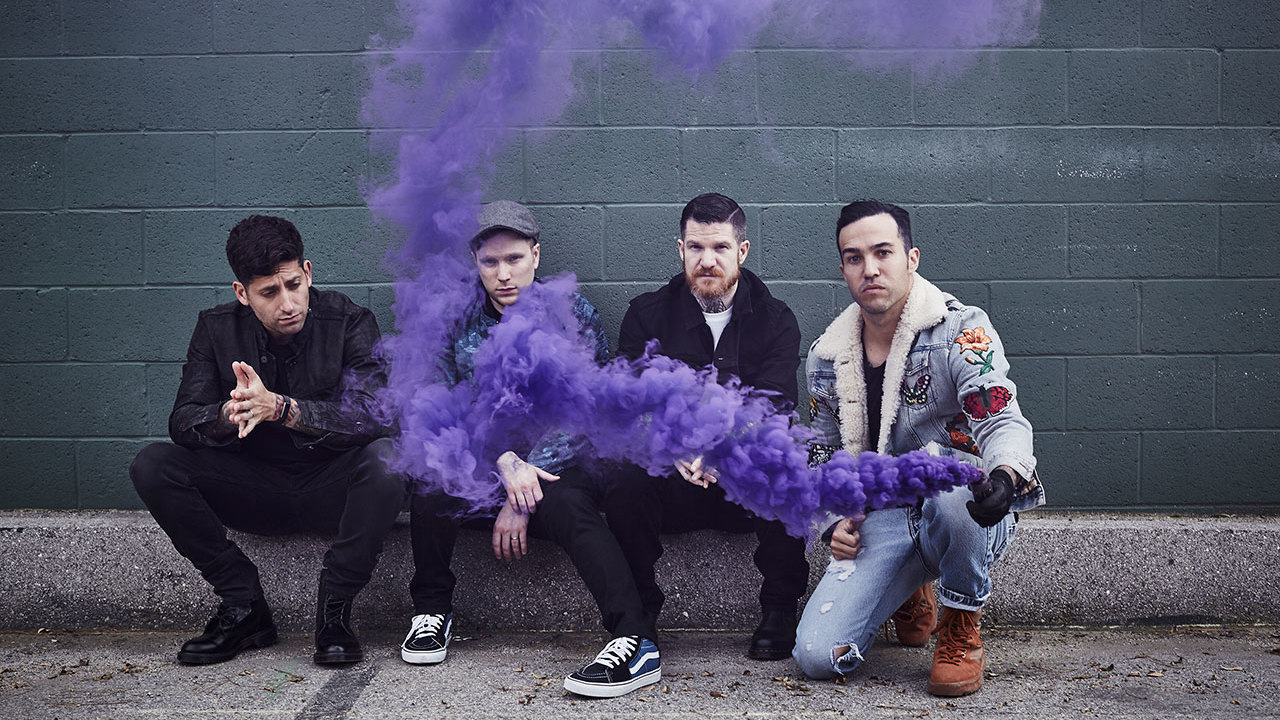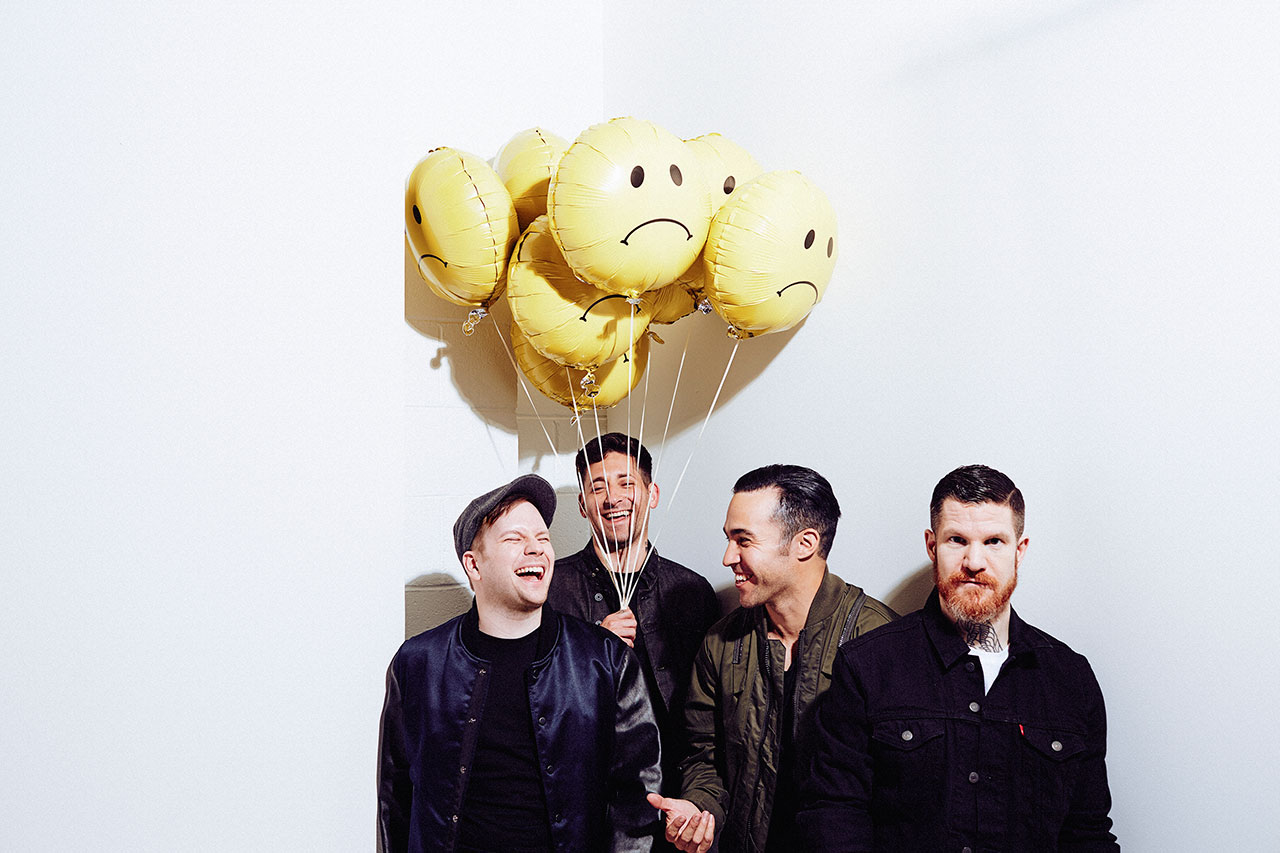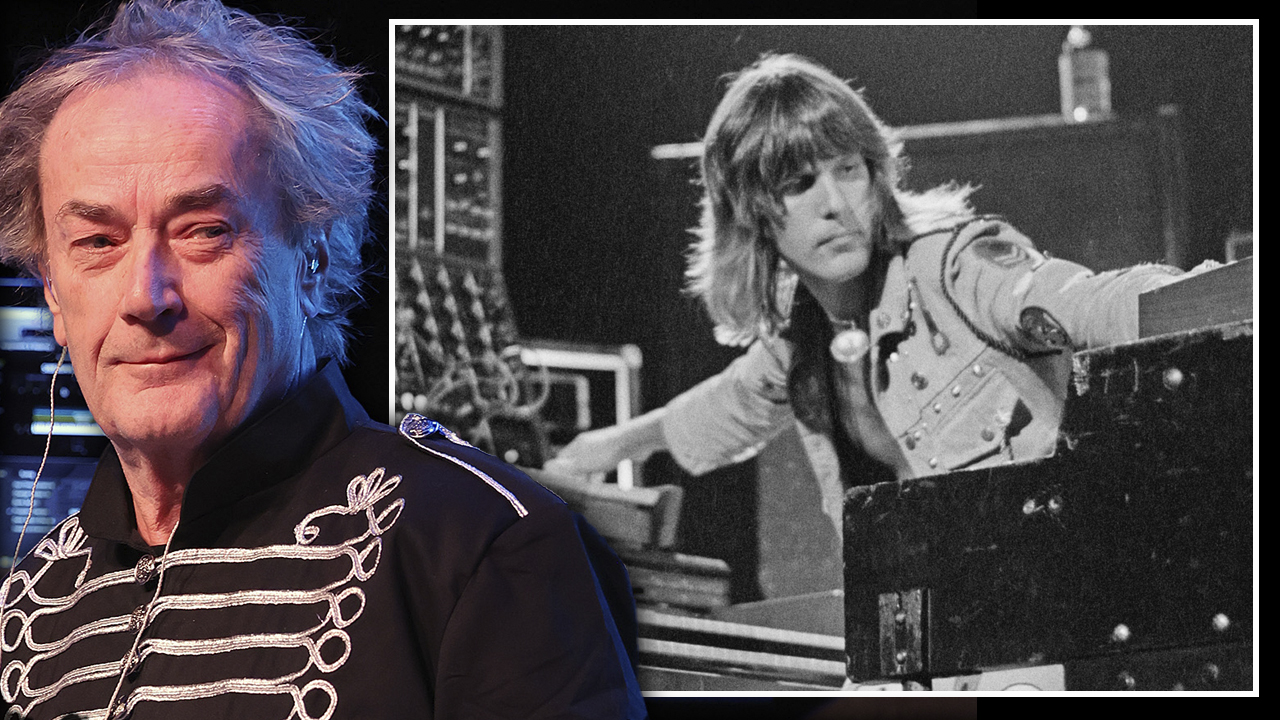Who are Fall Out Boy in 2018?
Famously dubbing themselves "too pop for rock and too rock for pop", we go on a mission to find out who, exactly, Fall Out Boy are in 2018

Select the newsletters you’d like to receive. Then, add your email to sign up.
You are now subscribed
Your newsletter sign-up was successful
Want to add more newsletters?
It’s a freezing cold night in January and Fall Out Boy are playing the third date of an intimate mini-tour at London’s Electric Brixton. Teenagers have camped outside the venue since the night before, enduring the perishing temperatures passing over the capital to ensure themselves a place at the very front of the barriers. When the doors open at 7pm, a queue of giddy young men and women is already snaking its way around the building and beyond. It’s the sort of frenzied behaviour usually reserved for chart-toppling juggernauts from the pop world. But at this point in their career, isn’t that exactly what Fall Out Boy are?
The band, who cut their teeth in the hardcore punk scene which circled Chicago’s suburbs in the late 90s, have come a long way since the straight-forward pop punk of 2003 debut Take This To Your Grave. While 2015’s American Beauty/American Psycho veered more towards the pop than it did the punk, forthcoming album M A N I A takes that idea and turbo-charges it. If the involvement of songwriting heavyweight Sia Furler – the woman responsible for a slew of Rihanna’s biggest hits as well as a top 40 pop career of her own – on the brooding, futuristic Champion wasn’t enough of an indication, new single Hold Me Tight Or Don’t (written, Pete Wentz tells us, about “that feeling when you’re waiting for a text message and those three dots keep coming up and then disappearing again”), is a burst of slick, modern R&B which could just as feasibly have been recorded by Justin Timberlake as it could Fall Out Boy. In short, they’ve gone and made a proper pop album. Is this the final nail in the coffin for Fall Out Boy’s career in rock music as we know it?
“I mean, it’s whatever you want to apply to it,” guitarist and co-founder Joe Trohman tells TeamRock when we pose the question to him the following afternoon. “I guess we – everyone – sees themselves differently from the way the world sees them. We don’t think this is a surprising change from what we were already making; it seems like everything’s been leading up to this. The plan was always to try to make something a little different, to push ourselves in what we think was a forward capacity for the band, and we ended up here.”
“With Fall Out Boy, there are some things you can set your watch to with the band,” he continues. “And there are some things that we’re just going to pull the rug out from underneath you on, and I think that’s good to do. Some people disagree; I think it’s been helpful for the band. I don’t think we’d be talking right now, or we’d be around still – at least in this capacity – if we had stuck with the same old, same old.”
- TeamRock+ Membership is now £2.99/$3.99!
- The 10 best Fall Out Boy songs, by Pete Wentz
- The Top 10 Best Fall Out Boy Videos
- The A-Z of Fall Out Boy
He has a point. With each new album, Fall Out Boy have refused to stick to a formula, even if that formula is one which has proven fruitful for them in the past, and it’s a move which has kept them one step ahead of their peers. Trohman’s also right that Fall Out Boy’s pop leanings are nothing new. Singles as far back as Sugar, We’re Going Down and Dance, Dance brought emo crashing into the mainstream, blurring the lines between counter and pop culture along with them. As a result Trohman is, frankly, bemused that the pop/rock divide is something we’re still asking him about. “I understand the necessity to genre-cise,” he says. “I understand that, because it’s possible to digest something if you understand where it fits in. So, it has to fit in somewhere, but I don’t care [where].”
“We’ve talked about it ad nauseam, but wasn’t the endeavour for a long time for rock music to take itself out of the standard paradigm and push itself into new, exciting, dangerous and sometimes unfortunate places?” he adds. “I don’t think it does that as much anymore. Which isn’t to say there aren’t awesome rock bands coming out, but it may or may not have something to do with why it’s not the dominant thing in music. It’s a lack of experimentation – and I’m not saying we’re the benchmark for experimenting in a band – but I personally think if there was more fearless experimentation in rock music, and that meant opening up one’s mind to thinking outside of just rock music, maybe that idea of the traditionalist rock’n’roll band would come back into larger prominence.”

He also makes the point that the lines between popstars and rock music have never really been clear cut. “I was working on a story recently where I was looking up a parody name for a 60s popstar,” he explains. “I looked up 60s popstars and they all came up as rock bands like The Kinks and the Rolling Stones. So I’m like, well, what the fuck does that mean?”
The latest news, features and interviews direct to your inbox, from the global home of alternative music.
He pauses, then chuckles. “I have a difficult time sometimes figuring out what we are, and I started the band. I don’t know where we fit in the modern rock spectrum. I know we’re somewhere in there, but I don’t know if that pocket has been figured out yet.”
Trohman may also be right that being plugged in and open to shifts in musical trends has kept them relevant in a way their early 2000s contemporaries – for instance, The Academy Is... or Panic! At The Disco – haven’t quite managed. It’s a phenomenon not dissimilar to that of Dazed And Confused’s high school girls: Fall Out Boy get older, their fans stay the same age. “It’s hard to really know [why],” Trohman says when quizzed on their perpetually youthful fanbase. “We came back with Save Rock And Roll and all of a sudden we had an entire new fanbase of younger people just getting into the band.”
While the band’s detractors lazily deride them for being “music for teenage girls”, Trohman is resolutely unbothered by the label. “I don’t know exactly why [we appeal to younger people], but it’s amazing,” he says. “It really is a key to longevity. Anyone that’s been into us for a super long time and is still into us; that’s fucking awesome, we couldn’t ask for anything more – but it’s not the key to growing more. You don’t grow more if you don’t get any new fans, and who drives the culture more than younger people?”
With every new album, and each subsequent shift to the mainstream, has come an inevitable backlash – either from disgruntled fans accusing the band of “selling out”; of forgetting their roots and cashing in on the band’s increased profile, or sneering rock critics dismissing Fall Out Boy as nothing more than bubblegum rock for kids. It’s easy to buy into the cynicism. But when faced with reality of who Fall Out Boy really are in 2018 – just a group of guys making a bit of music and having a laugh along the way – it’s also difficult to see where the harm in that lies. Especially when faced first-hand with joy they bring to their legion of fans, including the jubilant crowd which turns out at Electric Brixton: young people having the time of their lives, feeling every moment of every song, and singing back every word. Rock, pop – can’t it just be a bit of good, clean fun?
“We go play the songs and the crowd reacts fervently to them, which they did last night, and it seems like we’ve done the right thing,” concludes Trohman. “Everyone’s happy at the end of the day, and I don’t just mean content, I mean happy. That’s the type of information we really need so we can soldier on.”
Fall Out Boy’s new album M A N I A is out on 19th January via Island Records, and you can pre-order the album from Amazon now. The band head back to Europe for a full arena tour in March.
Track-By-Track: Fall Out Boy – American Beauty/American Psycho
Briony is the Editor in Chief of Louder and is in charge of sorting out who and what you see covered on the site. She started working with Metal Hammer, Classic Rock and Prog magazines back in 2015 and has been writing about music and entertainment in many guises since 2009. Her favourite-ever interviewee is either Billy Corgan or Kim Deal. She is a big fan of cats, Husker Du and pizza.

